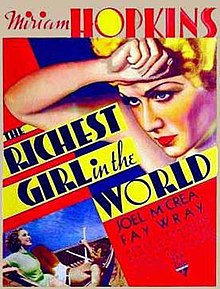
Vina Fay Wray was a Canadian-American actress best known for starring as Ann Darrow in the 1933 film King Kong. Through an acting career that spanned nearly six decades, Wray attained international recognition as an actress in horror films. She has been dubbed one of the early "scream queens".
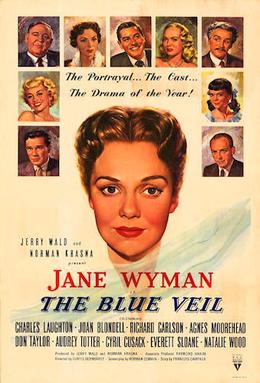
The Blue Veil is a 1951 American historical drama film directed by Curtis Bernhardt and starring Jane Wyman, Charles Laughton and Joan Blondell. It tells the story of a woman who spends her life caring for other people’s children, beginning just after World War I. The title refers to the headdresses once worn by governesses and nannies, colored blue to distinguish them from the white veils worn by medical nurses. The screenplay by Norman Corwin is based on a story by François Campaux, adapted for the French-language film Le Voile Bleu in 1942.

Joel Albert McCrea was an American actor whose career spanned a wide variety of genres over almost five decades, including comedy, drama, romance, thrillers, adventures, and Westerns, for which he became best known.

Dorothy Malone was an American actress. Her film career began in 1943, and in her early years, she played small roles, mainly in B-movies, with the exception of a supporting role in The Big Sleep (1946). After a decade, she changed her image, particularly after her role in Written on the Wind (1956), for which she won the Oscar for Best Supporting Actress.

The Devil and Miss Jones is a 1941 American comedy film directed by Sam Wood and starring Jean Arthur, Robert Cummings, and Charles Coburn. Its plot follows a department store tycoon who goes undercover in one of his Manhattan shops to ferret union organizers, but instead becomes involved in the employees' personal lives.

Mr. & Mrs. Smith is a 1941 American screwball comedy film directed by Alfred Hitchcock, written by Norman Krasna, and starring Carole Lombard and Robert Montgomery. It also features Gene Raymond, Jack Carson, Philip Merivale, and Lucile Watson.
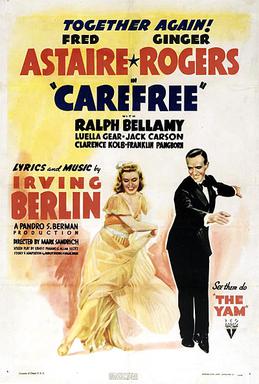
Carefree is a 1938 American musical comedy film directed by Mark Sandrich and starring Fred Astaire, Ginger Rogers and Ralph Bellamy. With a plot similar to screwball comedies of the period, Carefree is the shortest of the Astaire-Rogers films, featuring only four musical numbers. Carefree is often remembered as the film in which Astaire and Rogers shared a long on-screen kiss at the conclusion of their dance to "I Used to Be Color Blind," all previous kisses having been either quick pecks or simply implied.
Norman Krasna was an American screenwriter, playwright, producer, and film director who penned screwball comedies centered on a case of mistaken identity. Krasna directed three films during a forty-year career in Hollywood. He garnered four Academy Award screenwriting nominations, winning once for 1943's Princess O'Rourke, which he also directed.

Romance in Manhattan is a 1935 American romantic comedy film directed by Stephen Roberts, starring Francis Lederer and Ginger Rogers, and released by RKO Radio Pictures.

Thoroughly Modern Millie is a musical with music by Jeanine Tesori, lyrics by Dick Scanlan, and a book by Richard Morris and Scanlan. It is based on the 1967 film of the same name, which itself was based on the British musical Chrysanthemum, which opened in London in 1956. Thoroughly Modern Millie tells the story of a small-town girl, Millie Dillmount, who comes to New York City to marry for money instead of love – a thoroughly modern aim in 1922, when women were just entering the workforce. Millie soon begins to take delight in the flapper lifestyle, but problems arise when she checks into a hotel owned by the leader of a white slavery ring in China. The style of the musical is comic pastiche. Like the film on which it is based, it interpolates new tunes with some previously written songs.

The Most Dangerous Game is a 1932 American pre-Code horror film, directed by Ernest B. Schoedsack and Irving Pichel, starring Joel McCrea, Fay Wray and Leslie Banks.
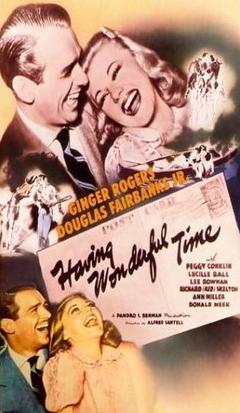
Having Wonderful Time is a 1938 American romantic comedy film adapted from Arthur Kober's 1937 Broadway play of the same name, directed by Alfred Santell and starring Ginger Rogers and Douglas Fairbanks, Jr. along with Lucille Ball and Eve Arden. It was Red Skelton’s film debut.

Century is a 1981 novel by Fred Mustard Stewart. The story follows four generations of an Italian-American family with settings in both America and Italy. Most of the events that take place in the novel, take place in actual American and Italian history. Readers are witnesses to the rise of Benito Mussolini, the Prohibition period, Black Tuesday, World War I, World War II, the attack on Pearl Harbor, the Holocaust, and the gradual formation of the motion picture industry in Hollywood. The novel spent six weeks on The New York Times Best Seller list.

Rockabye is a 1932 American pre-Code drama film starring Constance Bennett, Joel McCrea, and Paul Lukas. The final version was directed by George Cukor after studio executives decided that the original film as directed by George Fitzmaurice was unreleasable. The screenplay by Jane Murfin is based on an unpublished play written by Lucia Bronder, based on her original short story.
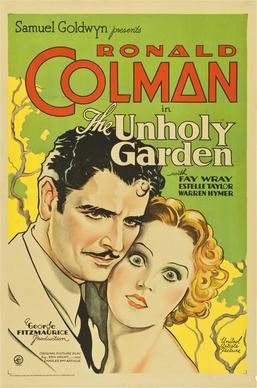
The Unholy Garden is a 1931 American pre-Code drama film directed by George Fitzmaurice and starring Ronald Colman and Fay Wray. It was based on a story by Ben Hecht and Charles MacArthur.
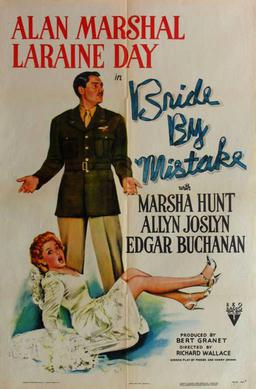
Bride by Mistake is a 1944 American romantic comedy film directed by Richard Wallace, and starring Alan Marshal and Laraine Day.

Sin Takes a Holiday is a 1930 American pre-Code romantic comedy film, directed by Paul L. Stein, from a screenplay by Horace Jackson, based on a story by Robert Milton and Dorothy Cairns. It starred Constance Bennett, Kenneth MacKenna, and Basil Rathbone. Originally produced by Pathé Exchange and released in 1930, it was part of the takeover package when RKO Pictures acquired Pathé that year; it was re-released by RKO in 1931.

Parole Girl is a 1933 American pre-Code romantic drama film directed by Edward Cline. The film stars Mae Clarke and Ralph Bellamy.

The Big Brain is a 1933 American pre-Code drama film directed by George Archainbaud and written by Sy Bartlett and Warren Duff. The film stars George E. Stone, Phillips Holmes, Fay Wray, Minna Gombell and Lilian Bond. The film was released on August 5, 1933, by RKO Pictures.

Three Blind Mice is a 1938 American romantic comedy film directed by William A. Seiter and starring Loretta Young, Joel McCrea, and David Niven that was based upon a play by Stephen Powys.
